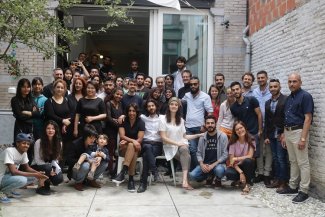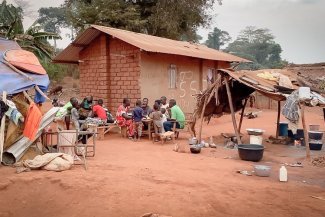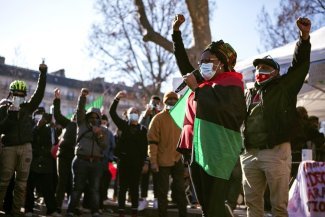

Upon their arrival in Poland, people who have fled Ukraine are oriented by volunteers on how to get to other towns and how to get help, like here in Medyka, on the country’s southern border, on 11 March 2022.
Vladimir and Anastasia consider themselves lucky. These two refugees from the war in Ukraine say their journey to Poland took only three days. They travelled by train from Krementchouk in eastern Ukraine, via Kiev and Lviv, to Rzeszów and finally to Warsaw. “Others travelled for longer,” says Vladimir. The 23-year-old Belarusian and his 22-year-old Ukrainian wife fled the war that was fast approaching their city. “Our train was leaving to the sound of sirens. We left all of Anastasia’s family and friends behind,” says Vladimir. “They decided to stay with her father, who cannot leave Ukraine because of military duty.” Since then, they have been worried about their relatives, with whom they are in contact via the internet.
Since 1 March, the couple have been staying with a 25-year-old Polish man, Hubert, in the Mokotów residential area of Warsaw. They occupy one of the three rooms of a renovated flat on the sixth floor of a post-communist building. In their little corner, they have stored a few bags they brought from Ukraine. In a tiny kitchen with windows overlooking the Warsaw skyline, the couple says: “Hubert was another stroke of luck. When we arrived in Rzeszów, a volunteer gave us a list of contacts who said they could accommodate refugees. Hubert was the second one we called. He told us: ‘Come on! There is a room waiting for you at my place.’”.
Just over two million people have entered Poland from Ukraine since the Russian aggression began on 24 February, according to Polish border police.
Poland is currently hosting the largest number of refugees. Like Vladimir and Anastasia, most of them have found refuge in private homes. As for Hubert, their host, he made a room in his flat available in response to a post on Facebook. “This room had just become available after my flatmate left. I joined several refugee support groups. I left my number in the contact database of one of them. Two days later, Vladimir and Anastasia arrived at my place,” explains the young economics teacher. To give his guests some privacy, he explains that he often goes to work in a café.
“We would like to stay in Warsaw,” continues Vladimir. “Hubert is helping us to write our CVs in English and we hope to find a job soon. He also found us free Polish lessons, which we started this weekend.” The Pole says he is ready to host the two young people for as long as it takes.
An army of volunteers at the Warsaw train station
In Warsaw and other Polish cities, there are thousands of volunteers helping: mostly individual volunteers, groups of neighbours organised on Facebook or some NGOs, such as Caritas. Their colossal work is very visible in the railway stations, where thousands of people arrive every day. At Warszawa Centralna, Warsaw’s central station, a veritable army of volunteers is waiting for them. Most of them are students and pensioners, but there are also employees and mothers and fathers who come to help after work.
Their distinctive sign is the yellow vests they wear, marked with the languages spoken: ENG, UA, FR or RUS (for English, Ukrainian, French or Russian). They work feverishly handing out food, drinks, clothes and Polish SIM cards, then helping to find accommodation or transport. They also entertain the children and look after the pets, who are as tired from the journey as their owners. Volunteers are equally active in the field and on the internet, for example in Facebook groups such as Pomoc dla Ukrainy (Help for Ukraine) Grupa Zasoby Warszawa (Warsaw Resources - Accommodation for Ukrainians).
Unfortunately, due to the lack of structural support from the Polish state, the volunteers have to organise themselves. Although they also receive donations, in cash and essential goods, from all over Europe, there are limits to their commitment.
“We can distribute food or help find accommodation,” says Magda, a volunteer who works at the reception point at the Central Station. “But we don’t have the skills, for example, to help refugees who are psychologically traumatised.” She adds that this lack of support is frustrating. “I’m afraid of burnout if it goes on like this.”
But for the moment, there is no sign of any real relief from the state. The only relief has so far introduced (on 15 March) has been a one-off grant of 300 zlotys (€63) to be paid to each Ukrainian refugee. It also grants payments of 40 zlotys (€9) per day for 60 days to persons and entities in Poland hosting refugees. Those hosting Ukrainian refugees can apply for the grant, by filling in a form at the town hall of their town or city. The money will also be paid retrospectively for the time that people have already hosted Ukrainians.
Since the activation of the European Union’s temporary reception mechanism on 3 March, Ukrainians can benefit from a status that gives them access to a visa, work authorisation, health care and schooling in any EU country, which they can join without restriction, for one year, and it is renewable. In Poland, the right of residence is legalised for 18 months, and they can also receive a national identity number (PESEL) and benefits.
Will these measures be enough? “Maybe,” says Hubert. “But the most important thing is that the state should take on some of the burden that falls on the volunteers. Because the situation will not be resolved any time soon and it is important to save your strength for a marathon rather than a sprint.”
In Romania, a “reactive, but not proactive” government
As of 20 March, over 527,000 people from Ukraine had entered Romania and only a quarter of them remained in the country, according to the Romanian border police. Civil society quickly mobilised to pro-vide emergency aid. The Facebook group Uniti pentru Ucraina (United for Ukraine) has more than 260,000 members to support the arrivals. The coders’ association Code4change, with the help of associations and the authorities, created a website in a few days that brings together all the necessary information: dopomoha.ro (‘Help’ in Ukrainian).
For Ukrainian refugees who arrive in Romania and want to stay, there are several options. For Ukrainians who do not wish to apply for asylum, the European temporary protection mechanism should apply. Stefan Leonescu, a lawyer for the Jesuit Refugee Service Romania, says it is “not very clear” yet how this will be implemented throughout the country and he fears that there will be inequalities between regions.
They can then apply for asylum, especially for those who have no documents. As of 12 March in Romania, 3,753 Ukrainian citizens had applied. They can get free accommodation, medical assistance and 20 lei per day (about €4) for food, while the General Inspectorate of Immigration (IGI) decides whether to grant them official refugee status. However, this comes with some constraints: their identity papers, if they have any, are confiscated during the application process, they cannot be mobile in Romania or outside the country, and they will not be able to apply for asylum in another European country. If the answer is positive, they will be able to access the labour market only after three months. As Romania is not in the Schengen area, they will have to stay there.
Moreover, according to Stefan Leonescu, “a positive response may not be automatic, as immigration may consider some people as not being individually targeted, especially if they come from cities that are not affected by bombings.”
There is also the issue of people who came from Ukraine but are not Ukrainians. Bassem, a 22-year-old Tunisian student, left Odessa on 26 February. “A policeman at the Romanian border told me I could stay as long as I wanted in Romania and work. In reality, this is not possible,” he says worriedly, because he does not want to return to Tunisia. Lawyer Stefan Leonescu is not optimistic for them. “I haven’t seen any signs from the ministries to improve the situation of people from other countries who have also fled the war,” he says.
At the local level, it is mainly NGOs and communities that think about the reception of refugees in the long term. With his association Civic Resource Centre, in the city of Constanţa, Cosmin Barzan and other volunteers are busy finding accommodation for refugees for several months, linking up with real estate agencies, setting up psychological support, and courses with Ukrainian teachers. “The demand is not yet strong, but we prefer to anticipate,” he explains, “the Romanian government is certainly reactive, especially at the borders where we work with it, but not proactive.” He accuses the government of waiting until the last moment to act when civil society is already ready: “The problem is that, unlike Moldova, the authorities are not very inclined to work with us on the integration of refugees.”
Moldova: feeling the pressure
Moldova, which is not part of the EU and where the temporary reception mechanism does not work, has taken its own measures. Maia Sandu’s pro-European government, in office since July 2021, reacted quickly when the military attacks began. As the first arrivals reached the border, the authorities set up tents for emergency accommodation and used public places, such as the Moldexpo exhibition hall in the capital city, Chișinău. However, almost two-thirds of the arrivals found accommodation with local people. At the end of February, the government convened a number of associations to work together to urgently address the need for accommodation, translation, food and transport.
An emergency support group, Moldova for Peace, was organised under the aegis of the Ministry of the Interior. “Collaboration between the government and civil society already had a precedent during the pandemic,” explains Cristina Sârbu, a volunteer who manages large humanitarian donations and partnerships with local organisations. “This cooperation was effective and built mutual trust.” Moreover, accrediting associations to work at the border and in the accommodation centres helps to reassure arrivals and prevent scams, such as the transporters who demanded a hundred euros to bring refugees to the capital.
However, the pressure on the country is enormous: Moldova is the country that receives the most refugees in relation to the number of inhabitants, while being the poorest country in Europe.
As of 20 March, over 362,000 people entered the country, a third of whom were planning to stay, for a population of nearly three million. While the Moldovan government is now facilitating access to work for Ukrainians during the state of emergency introduced on 24 February, it has also appealed for international assistance to avoid a collapse of the infrastructure and to facilitate access for Ukrainians to other European countries. Countries such as France have sent several tons of emergency humanitarian supplies and are hosting Ukrainian refugees from Moldova - 2,500 in France - on their territory.
Sârbu hopes “that those who want to stay can be integrated into Moldovan society and that this will give a boost to improving our system and infrastructure.”












